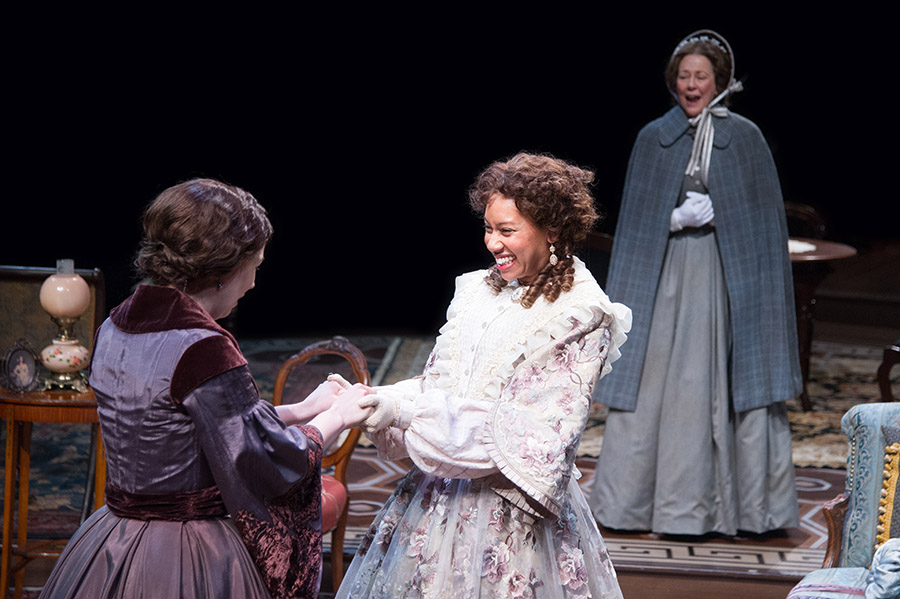
“The Heiress” at Arena Stage, playing through March 10, is a classic melodrama. The heroine, Catherine Sloper, is a plain-looking, exceedingly wealthy woman in mid-19th century New York City who takes a journey towards becoming an independent, strong human being when she discovers love.
On the other end of the social scale is Maria, the parlor maid, played by actress Kimberly Schraf. In this role, Schraf is returning to Arena Stage, where she has also appeared in “Ah, Wilderness!” and “The Women.” Below is an interview with Schraf about this latest role:
Maria represents a working woman in the 19th century with limited options. Do you think she is an honest portrayal of women of that time?
Maria doesn’t exist in Henry James’ novel “Washington Square,” on which “The Heiress” is based, but there had to be a parlor maid in the play to receive guests (and guests’ top hats, bonnets, gloves, capes and coats), to serve sherry, tea and biscuits, and to clear it all away between scenes.
She is the creation of Ruth and Augustus Goetzes, the playwriters/adaptors for a stage production. They did their homework—she is a credible depiction of a working-class woman of the mid-19th century—particularly for an immigrant, where a household placement could be a life-saving opportunity.
In our imagining of Maria, the Slopers have become a kind-of surrogate family. Though the work was backbreaking and relentless, it afforded her a security that she was not likely to have found elsewhere at that time.
What influence does Maria and her life as the parlor maid have on Catherine? How have you developed that in your interpretation of the role?
Maria and Catherine do not have much direct interaction in the play, yet Maria is keenly aware of Catherine’s painful social awkwardness, her deep desire to measure up to her father’s memory of his impeccable wife, and her private longing to be loved.
And that has been an intriguing challenge: to build the evolution of the relationship over the course of more than two years out of a few cursory exchanges, passing glances and overheard remarks.
For my part as Maria, I imagine that I’ve helped to raise Catherine and that I love her like a daughter even though I am bound by the protocols of mistress and servant. While I am unaware of any influence I have had on her, I deeply share her “emancipation” at the end of the play.
Within the melodramatic story, there is a lesson of the self-discovery by Catherine and what it means to become your own person. What is that like for Maria, a servant who has no choices in life but to do what she is told and without the gratitude she deserves? How and what does she “discover?”
We actively explored the notion of discovery and reclamation in “The Heiress,” through each character’s distinct lens.
While it would be unrealistic to imagine that the events of the play entirely transform Maria (who we are envisioning as an Irish immigrant who has been with the Slopers for as long as Catherine has been alive), she certainly serves as a witness to Catherine’s awakening, just as she’s been a witness to decades of Dr. Sloper’s criticism and judgment of his daughter.
By the final scene, when the two women, as well as Catherine’s Aunt Lavinia, are living in an all-female household presided over by Catherine, there has been change.
In these final moments full of discovery and wonder, I like to think that Maria glimpses for the first time the possibility of agency and independence for a woman.
One of her last lines in the play is “Miss Catherine! I said what I meant,” and that strikes me as a tremendous assertion in the wake of doing and saying what others expect of her.
Besides your role as an actress, you are also involved as a Steering Committee member of Actors Arena. How does that work?
Actors Arena is an investment in DC’s professional performers by providing a forum in which they can hone and develop skills as well as nourish the artistic spirit.
With financial support from Arena Stage, a steering committee programs monthly events—hands-on workshops, invited personal perspectives, and roundtable conversations—to create a space for dialogue and artistic growth. Sometimes a visiting artist or company is enlisted to present a master class, but more often, workshop leaders are from our own community.
This year’s theme is “Making Our Community the Company” and features local artists (such as Caleen Sinnette Jennings, Jennifer Nelson and Maria Goyanes) presenting events to inspire, rejuvenate, and strengthen our DC theater community.
By Sheila Wickouski

